Contributor Blog #6: Interview with Manaswini Das
An engineer by luck, a contributor by choice
We have many diverse contributors in opensource that help upstream communities in unconventional ways, which doesn’t require any coding or development skills. Starting with a non-code contribution can help anyone overcome the sense of failure and not being good enough, and it can also serve as a springboard for our open source adventure. This interview series aims to highlight some non-code open source contributions that anyone can make right now to get started contributing.
For this month’s edition, we talked about finding suitable projects to contribute, testing, documentation and speaking at conferences with Manaswini Das.
Thank you for taking some time out and interacting with us, Manaswini. Can you introduce yourself and share your journey so far?
I am Manaswini Das, and I have been working as a software engineer at Red Hat for over three years. I hail from Bhubaneswar, India. I wasn’t an engineer by choice but by a fortunate stroke of luck. I just knew I loved mathematics and programming(whatever I could learn in school) after I finished school. I decided to pursue a Bachelor’s degree in Computer Science, and that’s how this journey started.
In 2019, I joined Red Hat as an intern since I wanted to align my professional career with my love for open source. I have been working here for three years now. I still volunteer/speak at/organise meetups/conferences.
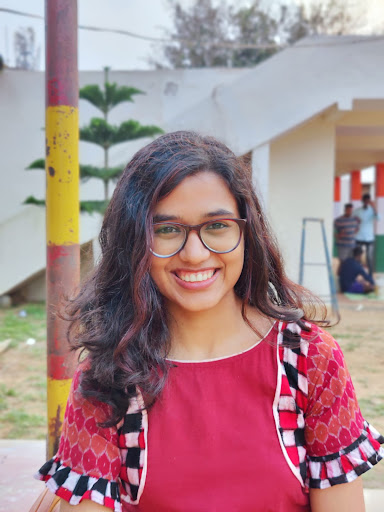
What communities have you contributed to?
As an intern, I, with the help of a few others, established a unified architecture for single-sourcing documentation between community projects and products. After that, I started contributing to DashBuilder, a part of RHPAM/DM, as a part of the Middleware India team.
I have contributed to other open-source communities like JBoss, Apache, Quarkus, Tern, Fossasia, Appwrite, GirlScript Foundation, etc.
How did your contribution journey start?
I got introduced to Linux when I joined the tech society of my college when I was a sophomore. I decided to participate in RGSoC and contributed to the HospitalRun project, and that’s how I was introduced to open-source programs. Initially, I started playing around with Android programming and then moved to cross-platform app development using Ionic and Cordova. Then, I slowly moved on to learning Python and JavaScript and Git. I noticed that all of this was open-source too.
I decided to dive deeper and made my first open-source contribution during Hacktoberfest 2017. I learnt that contributing to open-source will help me gain experience without getting an internship because that’s what most students face. If you don’t have experience, you don’t get an internship and vice-versa. I made it a habit to explore open-source projects and contribute in whatever way I could.
While zeroing in on projects to contribute to, I usually go through the website and try to understand the vision of the project. Then I try out the demos and if it piques my interest, I go through the documentation and start setting up the project and then start contributing. I try to look for projects that are for making people’s lives easier or come in the category for “Tech for good”. That’s how I got introduced to the Outreachy program. I asked my female seniors, and since nobody from our college had participated in this program before, they were skeptical about it. I decided to try, nevertheless. I got accepted in the Mar-May 2018 cohort(1st ever Outreachy intern from our college) under the Open Humans Foundation.
This project opened doors to new opportunities for me and boosted my confidence. I got a chance to deliver a talk at DjangoCon Europe 2019 about my Outreachy project(My project required me to add GitHub and Twitter data sources to the Open Humans platform. I was new to Django but not new to Python so I gave it a try). I was the only Indian speaker and a student at that time too. But I was surprised to see 400+ attendees, including senior engineers and managers, patiently listening to my talk. That’s when I realised that open-source communities are incredibly welcoming and don’t judge you based on your expertise.
Participating in such meetups/conferences made me realise the power of being a part of a community and encouraged me to engage in more such community meetups/conferences.
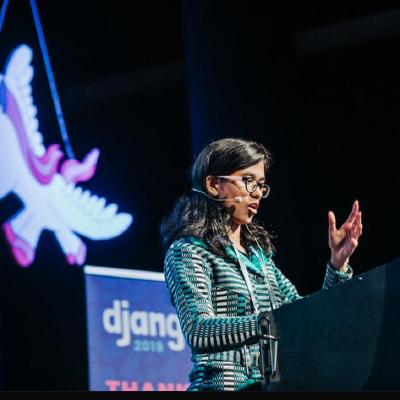
I even contributed to being a Processing Foundation fellow in 2019, where I, along with two other fellows, went to institutes and made students aware of P5.js.
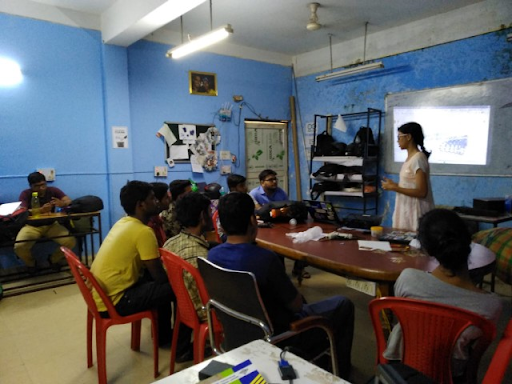
We also translated the P5.js website and Youtube tutorials into Hindi.
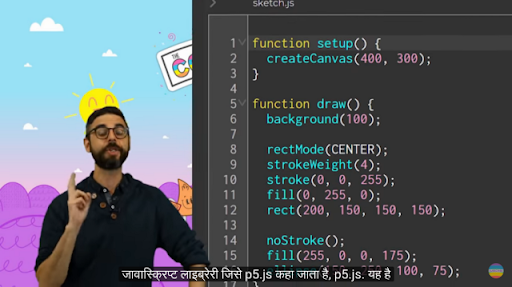
In what way(s) have you contributed?
Apart from raising/solving multiple issues in open-source projects both as a part of my daily job and not as a part of my daily job, I have contributed in many ways to open source, including testing, documentation(to open-source organizations like Quarkus, Apache etc.), proofreading(articles for my peers/juniors or anybody who is getting started with blogging), volunteering for or organizing meetups/conferences(have been a part of Pyladies D&I chair/organizer for PyCon India from 2019-2021). I have spoken at various conferences, including GitHub Universe 2021, DjangoCon Europe 2019, and PyCon India 2019. Here is a list of all the conferences I have been part of as a speaker https://github.com/manaswinidas/conferences_talks/. I also was a speaker for a Times Techies webinar.
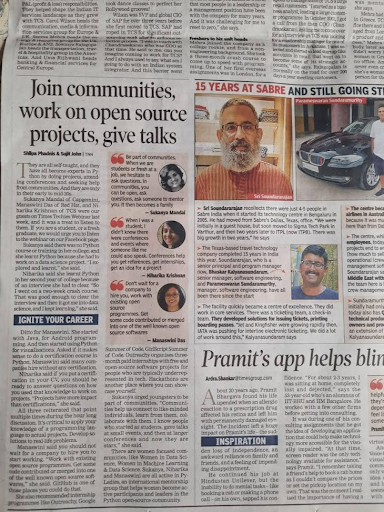
We also gave some insights about women in Python and how to get started. You can find the talk here: https://www.facebook.com/TimesTechies/videos/204638157936414
In addition to this, I also help newbies get started with open source. I have mentored in open-source programs like Google Code-In, Red Hat Open source contest, and GirlScript Summer of Code for multiple cohorts. I take a lot of interest in design thinking; I often jam up with other community folks to brainstorm ideas about better UX and make technology more inclusive and diverse. I also provide 1:1 mentorship to new Outreachy interns by being part of informal chats in which I mostly proofread their resumes and extend opportunities they may miss out on. I also was a part of Mentors Without Borders in 2020, where I mentored four underprivileged girls from Jharkhand and got them started with front-end development. I also write technical and non-technical articles on Medium(Feel free to check them out). I also am the lead and organiser of Pyladies Bhubaneswar(we didn’t have many sessions during the pandemic but we will be coming up with sessions soon). Feel free to checkout the Pyladies Bhubaneswar Youtube channel.
Can you talk about some of the challenges you might have faced?
Lack of role models: Things are changing for the better, but there are still many stigmas regarding female engineers in technology. They still think female engineers only do UI/UX.
Imposter syndrome: This is something that everybody faces. Some accept, while some deny. I feel that I need to do more, and other people out there are way better than me. This contributed to the fear of asking questions. But this doesn’t prevent me from doing whatever I can as I realized that sometimes a tiny idea could make a huge difference, and keeping that small idea to yourself doesn’t help.
Lack of awareness: Open-source has opportunities for people from all walks of life. I learned about opportunities very late when I could have leveraged them to learn and advance my career.
How do I get started with contributing your way?
TL;DR: Diversity Talk: Make The Most Out Of Open Source - Manaswini Das
The first step is learning about version-control systems like Git and finding your passion. Zero in on some language/framework that piques your interest. Then find projects in channels like https://goodfirstissue.dev/ or open-source programs and start reading the documentation(who knows, you might find some typos, thus leading to your first contribution) and doing project setup. Then, start with going through issues labelled “help-wanted”, “low-hanging fruit”, “good-first issue”, etc. Once you’ve found issues, start solving them but make sure no one else is working on the same issue. There are plenty of issues out there. Make sure no efforts are wasted. And at the end of the day, the issue should be solved, no matter who does it.
There is a lot of content on the internet, and one can quickly get started with any technology and even choose to switch careers. But it’s easy to get swayed away and overwhelmed. It’s crucial to stay focused and stick to one reliable resource. In the beginning, try to get as much practical knowledge as possible and develop a learning attitude. If you’re learning a concept, try to get your hands dirty and play around with the code. I know it may be intimidating but give it a try nevertheless.
Be bold in trying new things(Who knows, you can be the first person to achieve something that no one from your local community has ever achieved). Be open to learning anything and everything. This will give you a lot of exposure and expand your horizon. Be it a language/framework or a new domain, do not initially limit yourself to one particular language/domain. The future is polyglot and change is inevitable.
Be on the lookout for opportunities. Reach out to seniors/other contributors as and when required, but learn to help yourself first. Participate in meetups/conferences/hackathons and connect to like-minded people.
While these aren’t the only ways to contribute to open-source, you can also answer simple questions about open-source projects in open forums and public channels. You can also start a meetup group and raise awareness about open-source programs to help newbies get started with open-source and pay it forward. Mutual sharing can lead you to more opportunities.
Recommend one unconventional contributor whom you admire and tell us more about them.
Conferences/meetups gave me a chance to meet a lot of people transcending geographical barriers. So, it’s very difficult to name one unconventional contributor. I’d still name Iulia Avram and Sukanya Mandal.
Manaswini, thank you so much for taking the time to share your thoughts and experiences regarding contributions to open source software. Our conversation taught me a lot, and I hope that it will be beneficial to our readers. I greatly appreciate it.
I will leave you all with my favorite takeaway from this interview..
Sometimes a tiny idea could make a huge difference, and keeping that small idea to yourself doesn’t help.
Resources
- Conference Talks | https://github.com/manaswinidas/conferences_talks/
- Manaswini’s articles | https://manaswinidas.medium.com/
- Good First Issues | https://goodfirstissue.dev/
- Playlist of Talks | https://www.youtube.com/playlist?list=PLAzCkRsKko5vp1pQZqrcSIP7SWAPlfeRa
- Mentor Without Borders | https://www.mentorswithoutborders.net/
- Outreachy | https://www.outreachy.org/
Manaswini Das is from Bhubaneswar and currently working with the Red Hat Middleware team in Bangalore, India. She has been an active open-source user and contributor since 2017. She has participated both as a mentee and a mentor in various open-source programs including GCI, GSSoC, and RHOSC. She is an Outreachy alumnus and a Processing Foundation fellow. She loves sharing her knowledge at events and sketching. She can be reached out on LinkedIn, Twitter or via email
This blog post is part of the Nov edition of UnconventionalContributors, our monthly interview series about different ways to contribute to opensource. Don’t forget to check out the next one featuring Pradumna Saraf, a devops and Go developer from India.
Have a story to share? We’d be delighted to get in touch and discuss sharing your story. We are also open to suggestions for new content that will foster the community’s growth.
We’ll see you all in the next one. Till then, Happy contributing!👋🏻